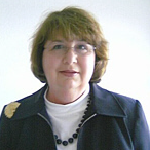
This story was written by Felicia Lederberger-Bialecki-Graber and shared as part of the Memory Project.
It is 1956, and I am sixteen years old. It is a beautiful spring evening. I am walking in downtown Frankfurt, Germany . It is rush hour and the streets are mobbed. People are rushing everywhere, some to catch the streetcar home, others to make a last minute shopping trip, still others to take care of an errand that did not get done during the day.
The church bells of the Paulskirche start their daily evening ringing. They bellow over the whole area. Traffic is bumper to bumper. Impatient drivers honk their horns. It is getting dark. The sun is setting. The dark clouds look ominous in the blue sky. I do not see the beauty of the setting of the sun; I see only the darkness enveloping the city. I only hear the terrifying noises, which are all around me.
My heart starts thumping; I could swear it is in my throat. It chokes me. I have trouble breathing. I want to get out of this crowd; I want to find a safe, quiet corner. I want to get home to my parents, to the safety of their welcoming smiles. I elbow my way through the crowd to the streetcar stop, which will carry me away from this tumult. Finally, the streetcar is here. I struggle to get in. I will not be left behind. I will not wait for the next car. I just have to get home.
What is happening to me?
It is September 1942. I am two years old. We, my mother, my father and I live in the ghetto in Tarnow, Poland. All Jews have been ordered to assemble on the city square early in the morning. Papers are checked. “Where do you work?” “Do you have the correct stamp of the week issued by the occupying forces?” We are safe. My father always manages to have the correct documents.
However, something goes wrong; we are not being released and allowed to go back to our one-room apartment. The Germans are changing the rules again. Thousands of men, women and children are kept on the square all day. Hungry, thirsty, the children are crying. Mothers and fathers try to calm them, to distract them. But they cannot even calm their own fears. “What is going on?” Why are we not allowed to go home?” What now?”
The sun is setting. It is getting dark. Suddenly a German officer yells through a megaphone, “Silence!” As one, the crowd falls quiet and listens.
“All children are to come forward,” the German yells. “They will be taken to another town, a more pleasant and healthier environment. Mothers with small children may accompany them if they wish.” “Schnell, schnell,” he continues. “Let’s move!”
Chaos breaks out. “What does that mean?” “Where are they taking our children?” “Should we go with them?” “Should we let them go alone?” “Are the Germans to be trusted?” “Are we to offer our children as a sacrifice and save ourselves? Or are we to go with them?” “If we go along, aren’t we just giving them more victims. We need to save ourselves; we can rebuild a family later.”
That is what my father is thinking; he always likes to follow his logic. He puts me on the truck, grabs my mother’s hand and drags her away. But I start crying. I do not understand why my parents are leaving me here with strangers. I scream. My parents stop dead in their tracks. They cannot do this. My mother frees herself from my father’s grip and runs toward me and climbs on the truck. My father follows. “You stupid fool,” says the German guard. “If that is the way you want it, go ahead.” It is dusk, it is a beautiful evening, the sun is setting, the clouds are gathering. A mob is yelling, shouting, shoving, running. The dusk, the tumult and the mob—it is all terrifying.
The fact that my father joined my mother and me on that truck saves all our lives. He is pulled out from that transport because someone intervenes on his behalf, and he is able to take my mother and me along back into the ghetto.
Dusk fell that evening in 1942 as it does in Frankfurt in 1956.

